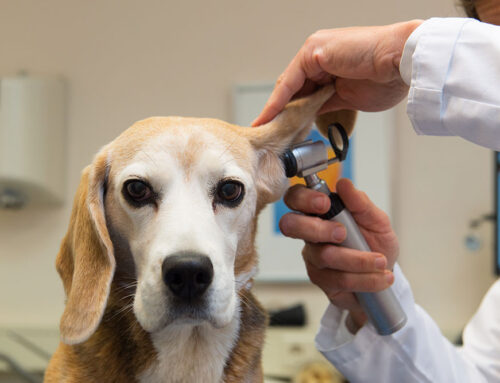Your pet has always been fastidious about keeping their coat well-groomed, but lately, the grooming seems uncontrollable. Your pet must be attempting to adjust every hair on their body at once. Does your pet have a compulsive disorder? The team at Palm City Animal Hospital wants to set your mind at ease by educating you on allergies and their effects on pets.
Pet allergies come in three types—fleas, environmental elements, and food can all trigger your pet’s allergies. When a pet is plagued by a hypersensitivity, they suffer extreme itchiness, and will scratch, chew, rub, and lick incessantly. They may also lose hair in the affected areas, and you may see crusty skin lesions where they have lost hair. Dogs tend to get lesions at the base of their tail, on their inner thighs, and down their back. In cats, the lesions are usually on their neck, face, and back.
Is a flea allergy responsible for my pet’s itchiness?
The bite from one lonely flea can cause considerable distress for your pet if they are allergic to fleas. When a flea bites your pet, they inject their saliva into your pet’s skin, and a protein in the saliva can trigger the allergic response. Flea allergies are the most common hypersensitivity seen in pets.
- Diagnosis — If your pet is excessively itchy, and you find a flea on them, they likely are suffering from a flea bite allergy.
- In severe cases, your pet may groom themselves so thoroughly, trying to remove the irritant, that no fleas remain.
- Their bedding also should be examined for fleas and flea droppings.
- Treatment — If your pet is diagnosed with a flea bite allergy, the first of three steps is to eliminate all fleas from your pet’s skin and coat.
- First, use the new flea medications to kill the fleas on the pet.
- Second, exterminate all fleas in your pet’s environment.
- Third, provide comprehensive, year-round flea preventive.
Is an environmental allergy responsible for my pet’s twitchiness?
Environmental allergies in pets are known as atopic dermatitis, which is the second-most common allergy seen in pets. Substances such as pollen, mold, dust mites, grass, and pet dander can cause an allergic response.
- Diagnosis — Allergy testing can be performed to pinpoint the causative agent.
- Serologic testing is available.
- Intradermal testing is more accurate. A small amount of a suspected allergen is injected into your pet’s skin. If a red swelling is produced, your pet is allergic to that substance.
- Treatment — Steroids can be used to decrease severe inflammation in the initial stages, but should not be continued long-term. Newer medications are now available for long term use.
- If your pet is allergic to pollen, keep them inside on days where pollen counts are high.
- If dust mites are the problem, keep dust in your home at a minimum and let your pet outdoors frequently for fresh air.
- Medicated shampoos should be used frequently to soothe your pet’s skin and remove allergens from their coat.
- Talk to the team at Palm City Animal Hospital about anti-itch medications that may bring some relief to your pet.
- Hyposensitization therapy is often most beneficial, but may take up to six months to be effective. The problematic allergens are injected into your pet’s skin in gradually increasing doses, or given orally, to decrease their response to the offending agents.
- No treatment is curative, and your pet will need lifelong veterinary care to prevent signs from recurring.
Is a food allergy responsible for my pet’s fidgetiness?

Your pet may develop an allergy to something they are eating. Proteins, particularly chicken and beef, are the most common problematic substances, and cause approximately 95% of food allergies. Your pet may exhibit vomiting and diarrhea when affected by a food allergy.
- A food trial is the only way to diagnose and treat a food allergy.
- Your pet will need a strict novel diet for 10 to 12 weeks.
- Novel diets contain only ingredients that your pet has never eaten.
- Common proteins include venison, duck, and kangaroo.
- Rice and sweet potatoes are common carbohydrates.
- Hydrolyzed diets can also be used during a food trial. These diets, which typically offer the best results, include protein broken down to such a small size that the body does not see the element as a threat.
- During the food trial, your pet must not eat any treats or flavored medications that may contain the prohibited ingredients.
- Once your pet’s signs have resolved, the ingredients from their former diet are gradually reintroduced to discover the problematic ingredient, which should be prohibited from their diet forever.
Your allergic pet does not have to suffer needlessly. The team at Palm City Animal Hospital is here to help you resolve this miserable experience for your pet. If your pet is itchy or you have any other concerns, do not hesitate to contact our team to schedule an appointment.








Leave A Comment